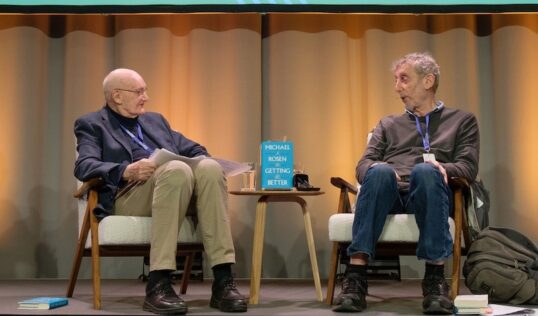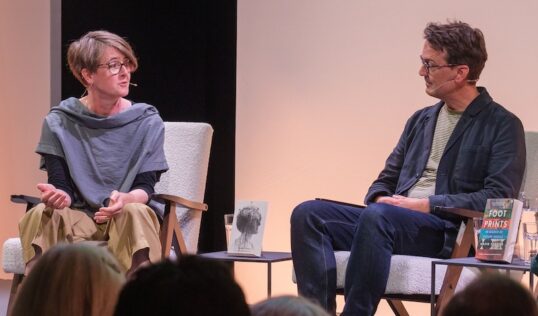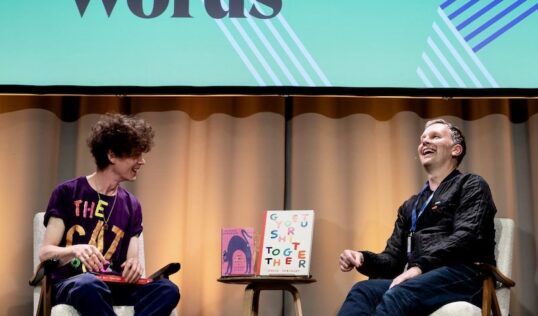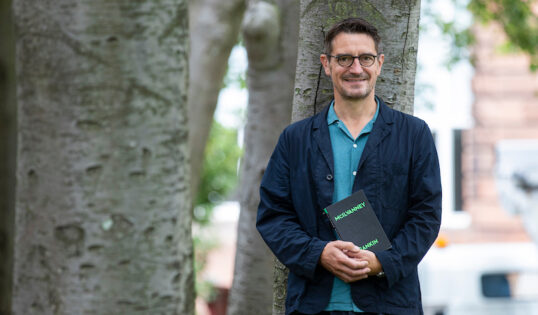Book Festival Round-Up – The Second Half
Farewell to Art College and Nick Barley
by Hugh Simpson
The 40th anniversary Edinburgh International Book Festival, and the last of Nick Barley’s 14 years as director, concluded with its usual intriguing mix of one-off events.
Closest to theatre was Boyhood, adapted from Max Porter’s Shy, his recent portrayal of a troubled young man. Somewhere between a rehearsed reading and a fully-fledged performance, this featured Porter himself with Allan Othieno, Genna Allan and Chloe Wyper from the Glasgow Citizens’ WAC Ensemble, Scotland’s first company for young adults with care experience.
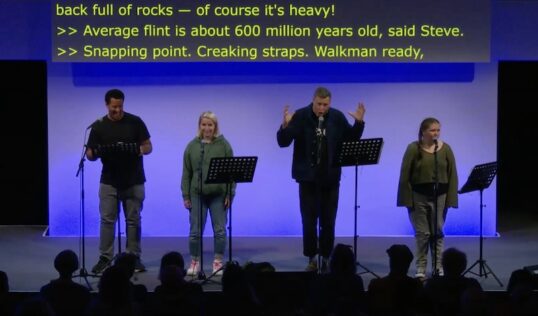
Allan Othieno, Max Porter, Genna Allan and Chloe Wyper in Boyhood. Pic from Edinburgh International Book Festival live feed.
Directed with a sure-footed kineticism by Eleanor Felton and punctuated by 90s drum and bass of the Kenny Ken school, this switched from lucid to fragmentary, with excellent use of the ensemble both as a chorus and in a variety of roles. As a depiction of raw humanity, hope and nightmares, the presentation echoed the experimental but utterly humane form of the book, featured excellent performances from the three WAC members, and cried out to be seen at greater length.
Porter himself was sensitively interviewed by Chitra Ramaswamy; his vigorous defence of what some have seen as faults in his books’ endings was convincing on both political and artistic grounds.
Las Vegas diva
There was theatre, too, in the appearance of Liz Lochhead – and not just in the way that she seemed to have delayed her entrance after being announced, like some Las Vegas diva, only for it to become apparent that a recently-installed new hip, and the resultant use of crutches, had slowed her up.
Her reading of the opening of her version of Medea was particularly arresting, instantly bringing back memories of Anne Lacey performing it in last year’s EIF staging.
There was an elegiac feel to some of Lochhead’s hour, performed solo, as she remembered her husband Tom, her parents, her teachers and Medea’s director Michael Boyd, but she has been doing this too long just to dwell on the past. In showcasing her upcoming New and Selected Poems, it was the new ones that dominated her interest.
Someone else who has been on the Scottish literary scene a hearteningly long time is James Kelman, whose towering status is still inexplicably doubted by some in the industry, with bookshop tables displaying Booker winners all too ready to leave him out.
That he is now published by US-based PM Press – whether it is because publishers here are not interested in his fiction, or refuse to handle his ever-trenchant political writings – is a national scandal. In Class Act, Kelman spoke, as always, with a refreshing honesty. He was particularly strong on the nuts and bolts of the writing life, such as how to organise your work, and how to overcome what he refuses to acknowledge as ‘writer’s block’.
considerable humour
Michael Rosen’s association with the festival goes back to the very first one; here, in Getting Better, he spoke eloquently, movingly and with considerable humour about a series of extremely personal topics – the Covid that seemed likely to kill him, other medical conditions, piecing together the stories of relatives who died in the Holocaust, and the sudden death from meningitis of his 18-year-old son Eddie in 1999.
Although he wrote Michael Rosen’s Sad Book about Eddie’s death, it is not something he is always comfortable discussing in public, but here he was chaired with the maximum of tact by Richard Holloway, whose gentle questioning and personal observations provided the ideal foil. That a couple of audience members leaving were heard to say that Holloway had spoken surprisingly little goes to prove that he had been the ideal chair.
Another former Children’s Laureate is Malorie Blackman, one of those writers who seems energised by telling stories no matter how many times she must have been through them. The publication of her memoir Just Sayin’ was an occasion for an exploration for life and thoughts that mixed the deeply personal with the sharply political to the extent that the audience were ready to go straight out and vote for her – or, as chair Nadine Aisha Jassat suggested, make her ‘Queen of the World’.
It is always astonishing just how different events featuring two writers sitting on stage discussing their work can be. David Farrier and Karine Polwart’s humane and solemn (but never overly so) Different Futures are Possible – an exploration of deep time, nature, history and art – was warm and often hopeful but decidedly downbeat. Michael Pedersen and David Shrigley verged on the riotous in Living in Colour. Shrigley’s acerbic observations, and Pedersen’s poems from The Cat Prince (although apparently autobiographical) often seeming to have a merely tangential relationship with reality.
storm-in-a-teacup
There is always so much to explore that the most intriguing things are not obvious. Victory To Words would no doubt have drawn a bigger audience had it been billed as Nicola Sturgeon, Chitra Ramaswamy and Simon Schama discussing Salman Rushdie, as that is what it was.
As a reminder that free speech is not just about the storm-in-a-teacup variety the Fringe tends to throw up, this was timely. Ramaswamy’s forensic analysis, Schama’s donnish, think-on-your-feet style and Sturgeon’s wider viewpoint made for an illuminating hour.
Sturgeon, of course, is part of a tradition of First Ministers at the festival, carried on by Humza Yousaf overseeing Right to Home the event featuring planning barrister and former child refugee Hashi Mohamed. Taking his duties very seriously, Yousaf was an accomplished chair, except perhaps when trying too hard to make jokes or justify the Scottish Government’s housing policy.
Such justification was probably called for, however, as – while admiring Yousaf’s personal journey – Mohamed was not about to let him off the hook regarding the calamitous UK-wide management of housing over many years. Not the least impressive thing about Mohamed’s performance was his ability just to take questions from the audience or online four at a time, occasionally correcting Yousaf (who was the one taking notes) concerning who had asked which question.
insight
One of the two Outriders Europe events featured Edinburgh and Kenya’s own Mara Menzies, who had journeyed to the threatened homeland of Sámi writer Rawdna Carita Eira, while Orkney-based Cal Flyn and German novelist Helene Bukowski had travelled to the Transylvanian mountains. From these voyages work-in-progress of widely varying types emerged.
Like Playing With Books (missing this year, but which Max Porter’s event closely resembled), Outriders was one of those strands introduced by Barley that constantly gave an insight into other worlds and the creative process.
It is important to go on record about how much is owed to Nick Barley for his 14 years in charge. For the first decade of his tenure, the festival grew and flourished in size and artistic ambition, before world events caused its revenue to fall off a cliff. Coming as this did together with the festival leaving its much loved but cramped Charlotte Square home, it is to the credit of all involved that this year’s event was as comparatively large and well-attended as it was.
It is only in the last year at the Art College that the festival location seemed to find its own identity; having all events on one site certainly helped, as did aspects like improved evening catering.
halfway-house
Criticisms that could be levelled – the halfway-house approach to streaming and screens at the venue, the sometimes still spotty provision of food and drink, the bookshop now just being a branch of Waterstones – can be countered by how grateful we are that we had any of it at all.
There are undoubtedly huge challenges to be faced on many levels by new director Jenny Niven as the Book Festival moves to the Futures Institute just along the road in 2024, but it is a testament to Barley’s pursuit of artistic endeavour and openness that it is handed over in as positive a state as it is.
The Book Festival will return in 2024
Online events
Many of 2023’s events are still available to watch online on a pay-what-you-can basis. Most are available to watch at any time, but a few are only available until midnight on Saturday 30 September 2023. More details at www.edbookfest.co.uk.
Events mentioned which are available to view online:
Max Porter: Boyhood. Details here. (Only available until 30 Sept 2023)
James Kelman: Class Act. Details here.
David Farrier & Karine Polwart: Different Futures are Possible. Details here.
Hashi Mohamed: Right to Home. Details here. (Only available until 30 Sept 2023)
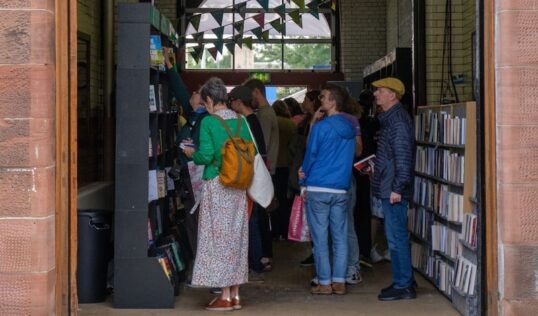
The Edinburgh International Book Festival book shop in 2023: “Another branch of Watersones”. Pic: EIBF
ENDS








